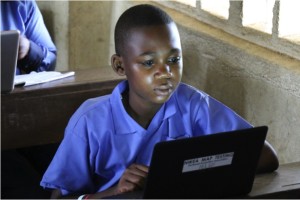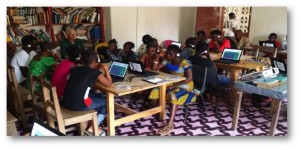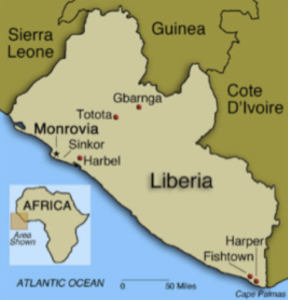
Teaching in Liberia has turned into a professional journey for Northwest Nazarene University’s Eric Kellerer.
“I believe students should have the opportunity to learn,” Kellerer said.
Kellerer is the director of the Doceō Center at NNU and teaches professional development to K-12 teachers and administrators.
In September, Kellerer and a group of educators traveled 200 miles south of Liberia’s capital city, Monrovia, to help transform education. The group delivered more than 100 laptops, 600 books and wireless servers to accelerate learning in Liberia.
“Of all the students we worked with, only two had ever used a computer,” Kellerer said. “The students lit up like it was Christmas and were hungry to learn about the computers.”
Liberia has been slowly rebuilding from a 14-year civil war that ended in 2003. Then nearly two years ago, the Ebola epidemic erupted, ravaging the country and destroying livelihood.
“The education system in Liberia is horrendous because of these events,” Kellerer said.
Nearly 600 students in ninth and 12th grade at eight different schools are primarily learning math through the Khan Academy, a free, educational website. Kellerer tested the students to find out what grade level their math skills were at. He found most were at least five grade levels behind.
“Because of the civil war, the ages of the students are quite different and we are seeing some that are 30 years old,” Kellerer said. “Many were soldiers as children and are coming back to get an education.”

During the fall of 2013, Kellerer helped manage and facilitate the Idaho Khan Academy pilot project, which led him to the opportunity in Liberia.
“Idaho is small enough we can change the way things are done,” Kellerer said. “I’m balancing fine with the international work, but I really want to see Idaho become a shining star educationally around the world.”
Ambassador Enterprises and private donations have funded the education project in Liberia. Gary Friesen, the educational innovation director at Ambassador Enterprises, is working with Kellerer on the project and believes it’s a game changer.
“If things go well, we are hoping to scale nationwide in the next four years in 700 schools,” said Friesen, who recently returned from Liberia. “These schools have very little resources.”
In 2013, 25,000 students took the Liberia university entrance examination, and not one student passed. Most schools do not have textbooks for the students, and teachers have few resources other than a chalkboard.
“Liberia is a nation in the world in which the children are worse educated than the parents,” Kellerer said. “If we don’t work with these students, they will never be able to have a generation that gets out of the cycle of poverty.”
In May, Kellerer will return to Liberia and test the 600 students to find out if the resources provided helped increase math skills.
“I want to be a part of changing a generation,” Kellerer said.
For more information about the project, click here.
Photos and video by Eric Kellerer.
